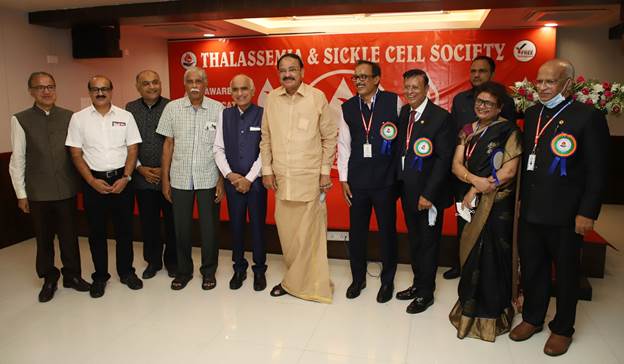
The Vice President, Shri M. Venkaiah Naidu today highlighted the importance of preventive measures to address the huge burden of genetic diseases like thalassemia and sickle cell anemia in the country. He wanted the states to undertake mass screening of the children for early identification and management of genetic disorders.
Addressing a gathering after inaugurating the Research Laboratory, Advanced Diagnostic Laboratory and 2nd Blood Transfusion Unit at the Thalassemia and Sickle Cell Society (TSCS) in Hyderabad today, the Vice President urged the private sector and NGOs to complement the government’s efforts in combating genetic diseases. Recognizing that the available treatment options for these genetic conditions– bone marrow transplantation or regular blood transfusion – are cost intensive and distressing to the child, Shri Naidu called for a comprehensive approach to address the health challenge of Thalassemia and sickle cell anemia.
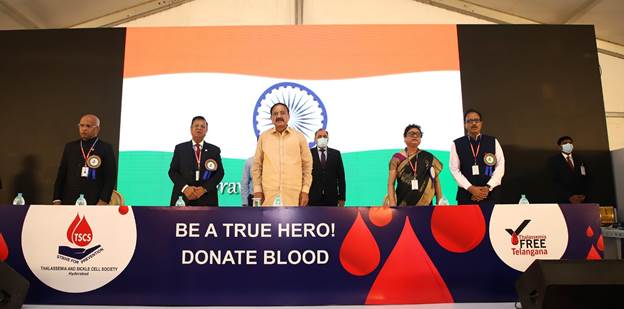
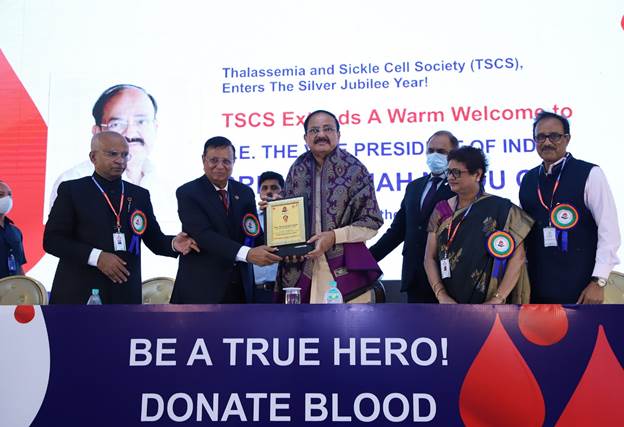
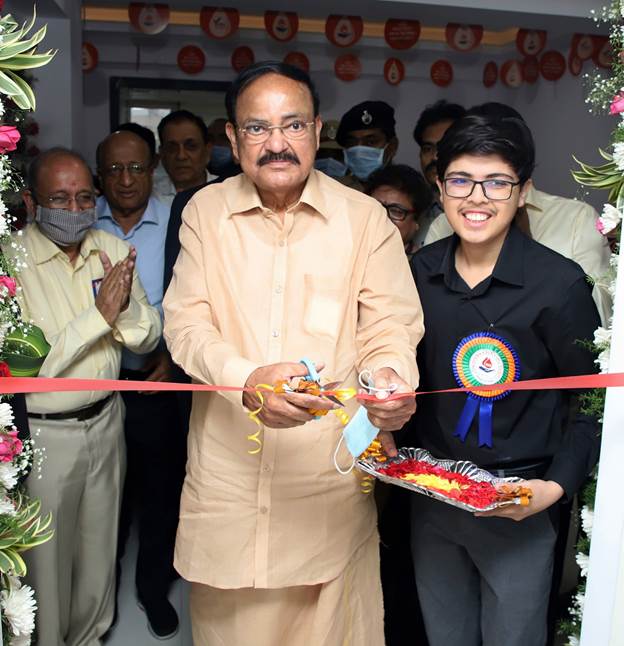
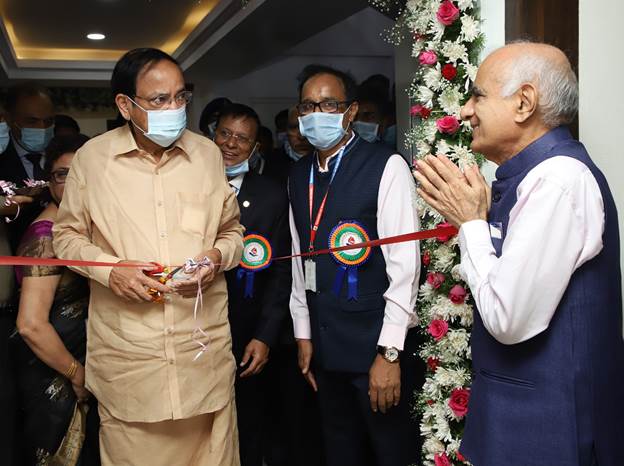
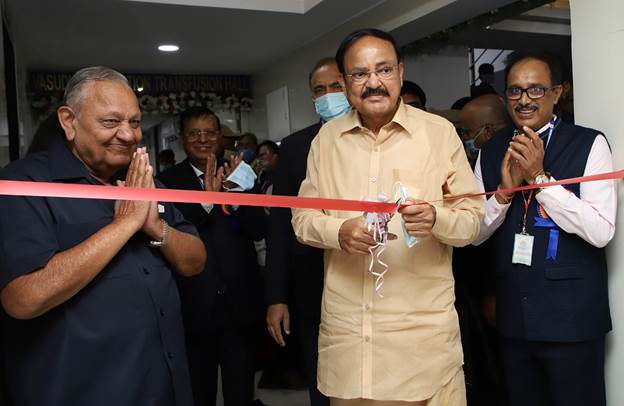
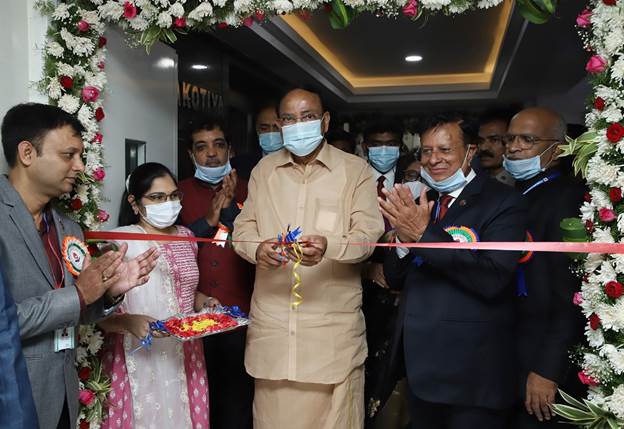
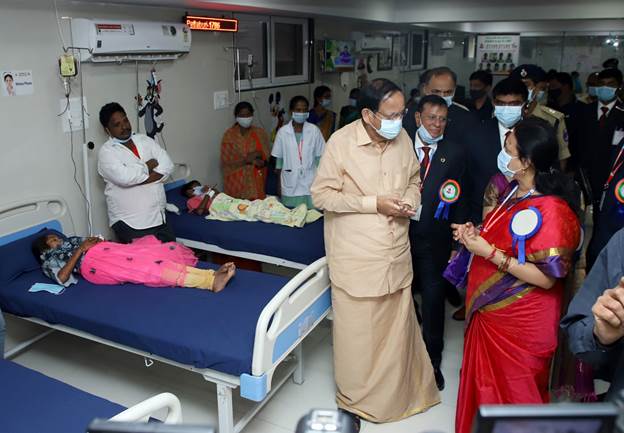
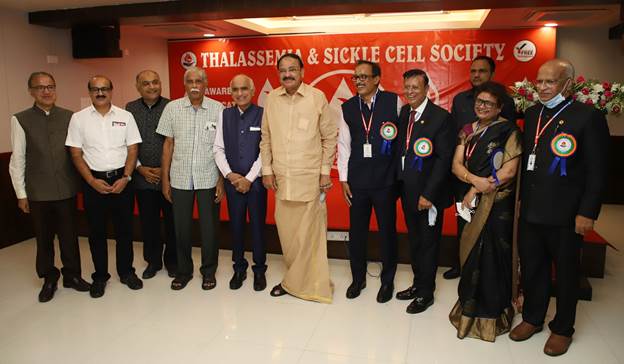
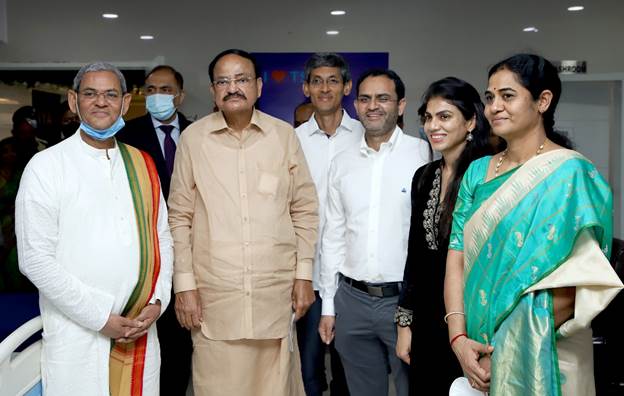
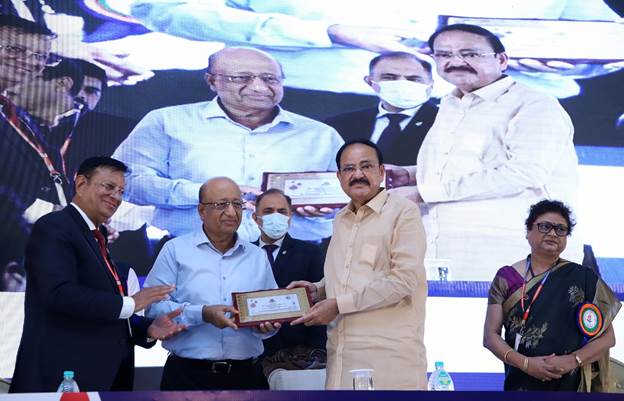
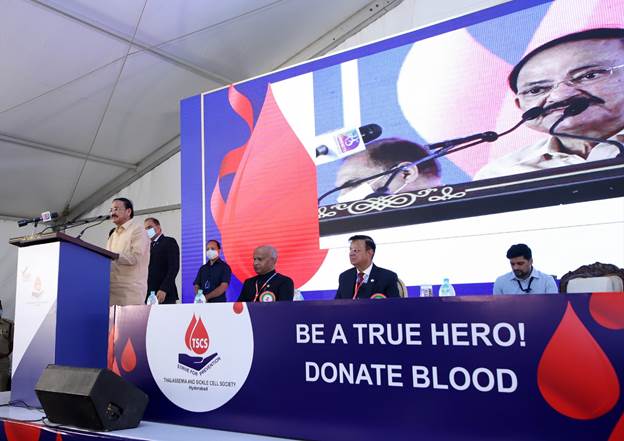

The Vice President at Thalassemia and Sickle Cell Society in Hyderabad today
Mentioning that around 10-15 thousand babies are born every year with Thalassemia in India, the Vice President said that lack of awareness on these genetic diseases is a major impediment in their prevention and early diagnosis. Therefore, he urged all stakeholders – doctors, teachers, public figures, community leaders and media – to spread awareness on Thalassemia and sickle cell disease. Complimenting TSCS for providing free treatment to patients suffering from these genetic diseases, Shri Naidu wanted the private sector to set up more diagnosis and treatment facilities, especially in tier two and three cities and rural areas to make healthcare accessible to all.
Describing gene disorders a major health concern in the country, the Vice President said that they impose a heavy economic and emotional burden on the affected families. Statistics show that prevalence of beta- Thalassemia is in the range of 2.9 to 4.6% in India whereas sickle cell anemia is more prevalent among lower socio-economic sections of society, ranging from 5 to 40 % among the tribal populations. He said that early detection of genetic disorders will help in counseling the patients, thus avoiding marriage of two individuals who are silent carriers of defective genes which may lead to serious genetic abnormalities in their children.
Noting that children affected with Thalassemia need regular blood transfusions throughout their life, Shri Naidu exhorted the youth to come forward and donate blood for the needy. He also appreciated the Union Health Ministry for coming up with detailed guidelines for prevention and management of Thalassemia, Sickle cell anemia and other variant anemia.
Observing that the country has seen considerable improvement in various health indices since independence, the Vice President said that still there are challenges in ensuring quality and affordable healthcare for all. Stressing the need to address the shortage of trained human resources in healthcare on war footing, he suggested making rural service mandatory for young doctors before getting admission to PG courses. “Scaling up e-Health initiatives in rural areas using digital tools is another cost effective method for making healthcare accessible to all,” he added.
Referring to the problem of high out-of-pocket expenditure on health, Shri Naidu said that it adversely affects the low-income households that face the risk of being pushed into poverty. Highlighting that quality and affordable healthcare is an important aspect of governance, Shri Naidu said that it should be accorded top priority by the Center, states and local bodies. He praised the Government’s flagship scheme ‘Ayushman Bharat’ for helping many poor families and stressed that providing quality and affordable healthcare is a shared responsibility of the public and private sector.
The Vice President praised the members of Thalassemia and Sickle Cell Society for their noble work towards eradicating these diseases from the country. Stating that ‘share and care’ is the core of Indian philosophy, he wanted everyone to inculcate the values of service mindedness and concerns for others, particularly for weaker sections. “Serving the poor is serving the God,” he stressed. On this occasion, Shri Naidu also inaugurated the Main Auditorium and Mini Auditorium at TSCS.
Shri Chandrakant Agrawal, President, Thalassemia and Sickle Cell Society, Smt. Ratnavali K., Vice President, TSCS, Dr. Suman Jain, Chief Medical Research Officer and Secretary, TSCS, Ms. Azra Fathima, Clinic Psychologist, TSCS, donors of the Society, doctors, and other eminent personalities attended the event.
Following is the full text of speech –
“At the outset, let me compliment the Thalassemia and Sickle Cell Society for its noble efforts in ensuring treatment free of cost to those affected by Thalassemia and sickle cell anemia and improving their quality of life. With the inauguration of the 2nd Blood Transfusion Unit and Advanced Diagnostic Laboratory here today, I am sure the society’s efforts will get a further boost in providing quality treatment and management of Thalassemia and Sickle Cell Anemia.
Dear sisters and brothers,
Gene disorders are a major health concern in our country and impose a heavy economic and emotional burden on the affected families. Statistics show that hemoglobin disorders are the most common single-gene disorder, impacting around seven percent of the population globally. In India, prevalence of beta- Thalassemia is estimated to be in the range of 2.9 to 4.6 % whereas sickle cell anemia is more prevalent among lower socio-economic sections of society, ranging from 5 to 40 % among the tribal populations.
I am told that approximately 30 million Indians are silent carriers of beta-thalassemia and lead a normal life. The available treatment options for this genetic condition– bone marrow transplantation or regular blood transfusion – are cost intensive and distressing to the child.
Therefore, our focus must be on preventive measures. As you all are aware, marriage between two such silent carriers of defective genes may lead to serious genetic disorders among their children. Mass screening for silent carriers of defective genes of children at an early age will greatly help in detecting genetic disorders. It is essential to undertake such an exercise in all the states by the respective governments. The private sector and NGOs must also come forward in complementing the efforts of the government.
Early detection will help in counseling the patients about the condition. Thus, it can also prevent marriage of two individuals who are silent carriers of defective genes. Many times, prenatal genetic screening tests are also undertaken to detect genetic abnormalities in the foetus.
Indeed, a comprehensive approach is required to address this health challenge of Thalassemia. The Union Health Ministry has prepared and issued detailed guidelines for prevention and management of Thalassemia, Sickle cell anemia and other variant anemia. The guidelines provide for screening of every pregnant woman during Ante-natal care, pre-marital counseling at the college level and one- time screening for variant anemia for all children in class VIII. The Ministry of Tribal affairs has also taken several steps to control the prevalence of sickle cell anemia in coordination with medical bodies such as ICMR.
Despite these efforts, unfortunately, around 10-15 thousand babies are born every year with Thalassemia in India. Lack of awareness on these genetic diseases is a major impediment in their prevention and early diagnosis. I would request all stakeholders – doctors, paramedics, teachers, public figures, community leaders and media – to spread awareness on Thalassemia and sickle cell disease. Private sector must also come forward to set up diagnosis and treatment facilities, especially in tier two and three cities and rural areas. I would like to once again compliment Thalassemia and Sickle Cell Society (TSCS) for providing quality treatment to patients suffering from Thalassemia and Sickle Cell Anemia. I am happy to note that all the facilities at this Centre are free of cost thus making healthcare accessible to all.
As children affected with Thalassemia need regular blood transfusions and management throughout their life, access to safe quality blood for transfusion is a major challenge in their care and treatment. I urge the youth of our country to come forward and donate blood for the needy.
Dear friends,
We are celebrating the 75th year of our Independence. Over these seven and half decades, various health indices have improved considerably in the country. Life expectancy at birth has increased, infant and maternal mortality have greatly reduced and many deadly diseases such as smallpox and polio have been completely eradicated.
However, still there are challenges in ensuring quality and affordable healthcare for all in the country. India has a low doctor to population ratio, at 1:1,511 against the WHO norm of 1:1,000. This shortage of trained human resources in healthcare needs to be addressed on a war footing. This problem is acute in rural areas and I would suggest making rural service mandatory for young doctors before getting admission to PG courses. Scaling up e-Health initiatives in rural areas using digital tools is another cost effective method for making healthcare accessible to all.
Another problem is high out-of-pocket expenditure, which adversely affects the low-income households that face the risk of being pushed into poverty. The Government’s flagship scheme ‘Ayushman Bharat’ is a praiseworthy initiative in this regard providing health assurance to many poor families.
In the end, we must remember that providing quality and affordable healthcare is a shared responsibility of public and private sector. Organizations like TSCS are showing the way through their excellent work. I hope to see many more such initiatives by the members of our medical fraternity.
Thank you.
Jai Hind!”




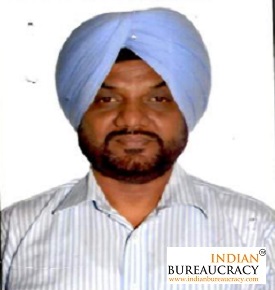

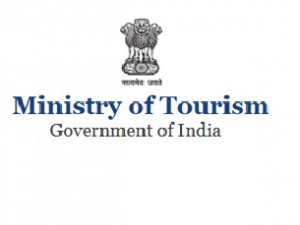
Leave a Reply
You must be logged in to post a comment.